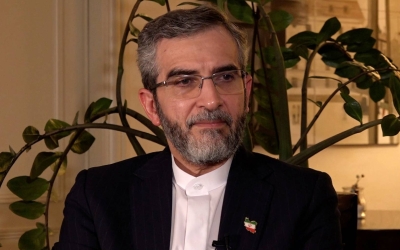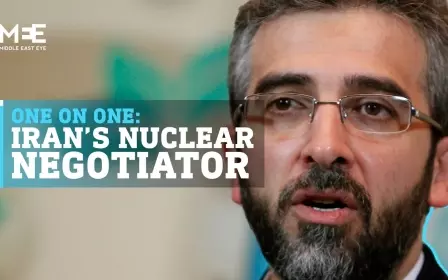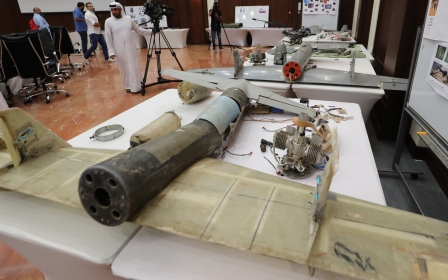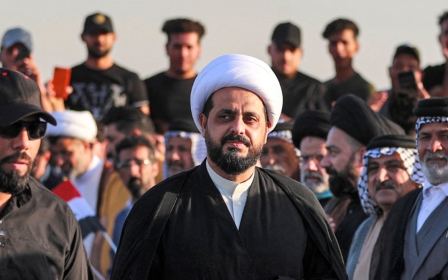Iranian press review: Conservatives open 'sins rehab clinic'

The clinic for the 'rehabilitation of sins'
A poster advertising a clinic for "sins rehabilitation" under the guidance of conservative clerics and a hardline deputy minister has prompted anger and mockery on Persian social media.
The poster advertised a 40-day rehabilitation programme consisting of 25 lessons, four online conferences, four Q&A workshops and a daily checklist for the sinners.

Critics were quick to take to social media and lambast the organisers of the programme for their business-based approach to dealing with religious matters.
"Commercialising religion comes from politicising religion," Abbas Abdi, a well-known political analyst, wrote on Twitter. "Nowadays, to learn how to stop sins, one should pay a good amount of money and go to a 'clinic' run with religious celebrities," he added.
Others mocked officials who plan religious programmes in Iran.
"It is as if a drug addict opens a rehab centre, or someone obese gives a diet for losing weight. You misters! You yourselves are addicted to committing sins," tweeted one user.
Vahid Yaminpour, the hardline deputy minister of youth and sports, and Amir Hossein Daryaei, a conservative cleric, were two specialists named as rehabilitation experts at the clinic.
A third expert was Seyed Bashir Hosseini, an religious academic known for his theory about a correlation between football and sexual desire.
According to his theory, people from countries with higher libidos play better football.
Palm trees sold to Qatar returned by Doha
Following days of contradictory reports about the smuggling of palm trees to Qatar, it has been revealed that Iran's agriculture ministry had authorised the export of the trees to the Gulf state, but that Doha had refused to accept them and returned the shipments.
During the past two weeks, a photo of trailers carrying tall palm trees had been widely circulated on Persian social media, along with reports claiming the trees were being smuggled to Arab states.
Some official outlets also published the news.
According to the reports, Iranian palm trees were beong smuggled to Qatar to be used for landscape design and the expansion of green space projects related to the 2022 Fifa World Cup, which is being hosted by the Gulf state.
On Friday, Iran's ISNA news agency revealed that despite a ban on exporting local variants of palm trees, four shipments of trees had been registered with Iran's customs administration in the port city of Bushehr.
According to ISNA, since October 588 palm trees with a value of $136,100 were exported to Qatar, with all necessary authorisations. However, Qatar did not accept the exports and returned the trees to Iran.
The exact reason for the return of the trees was unclear, as Iranian officials gave contradictory explanations over the matter.
Zahra Jalili Moghadam, head of the tropical and subtropical fruits office at Iran's agriculture ministry, said that Qatar returned the palm trees due to a high risk of transferring infections and plant disease to the host of the 2022 World Cup.
However, Mohsen Rashid Fakhry, the director of Iran's National Date Association, told the Mehr news agency that the shipments were returned because the exporter used unclear documents, which Qatar refused to accept.
However, in an interview with the ILNA news agency, he said that the reason was that Qatar had refused to approve the health certificate issued by Iran for the trees.
Sharp increase in child marriages
A new report has shown a sharp increase in child marriages in Iran, amid attempts by children's rights activists and reformist legislators to pass a law banning the marriage of girls younger than 16.
The new report, revealed by local media, confirmed activists' assertions about the ineffectiveness of current laws in preventing the practice.
According to seasonal data released by Iran's statistical centre, 9,753 girls aged between 10 and 14 got married last spring, a 32 percent rise compared to the same period in 2020.
The report also stated that 45,522 girls aged between 15 and 19 had got married during the same period.
Meanwhile, separate data published by Iran's national organisation for civil registrations also shed light on another issue caused by child marriages: that of underage pregnancies.
Data showed that in the first half of the Iranian year, which began on 21 March, mothers younger than 14 gave birth to 969 babies.
Iran's poorest province, Sistan and Baluchestan, had the highest rate, with two girls aged 10, two aged 11, nine aged 12, 37 aged 13, and 182 aged 14, giving birth over the six-month period.
According to a law passed in 2000, the marriage of girls younger than 13 is only allowed with consent from the girl's father and permission from a court.
However, rights activists say thousands of underage girls are forced to marry every year without permission from the courts.
In recent years, conservative and religious politicians have foiled attempts by activists to put a legal ban on the marriage of girls younger than 16 and boys younger than 18.
*Iranian press review is a digest of news reports not independently verified as accurate by Middle East Eye
Middle East Eye delivers independent and unrivalled coverage and analysis of the Middle East, North Africa and beyond. To learn more about republishing this content and the associated fees, please fill out this form. More about MEE can be found here.





